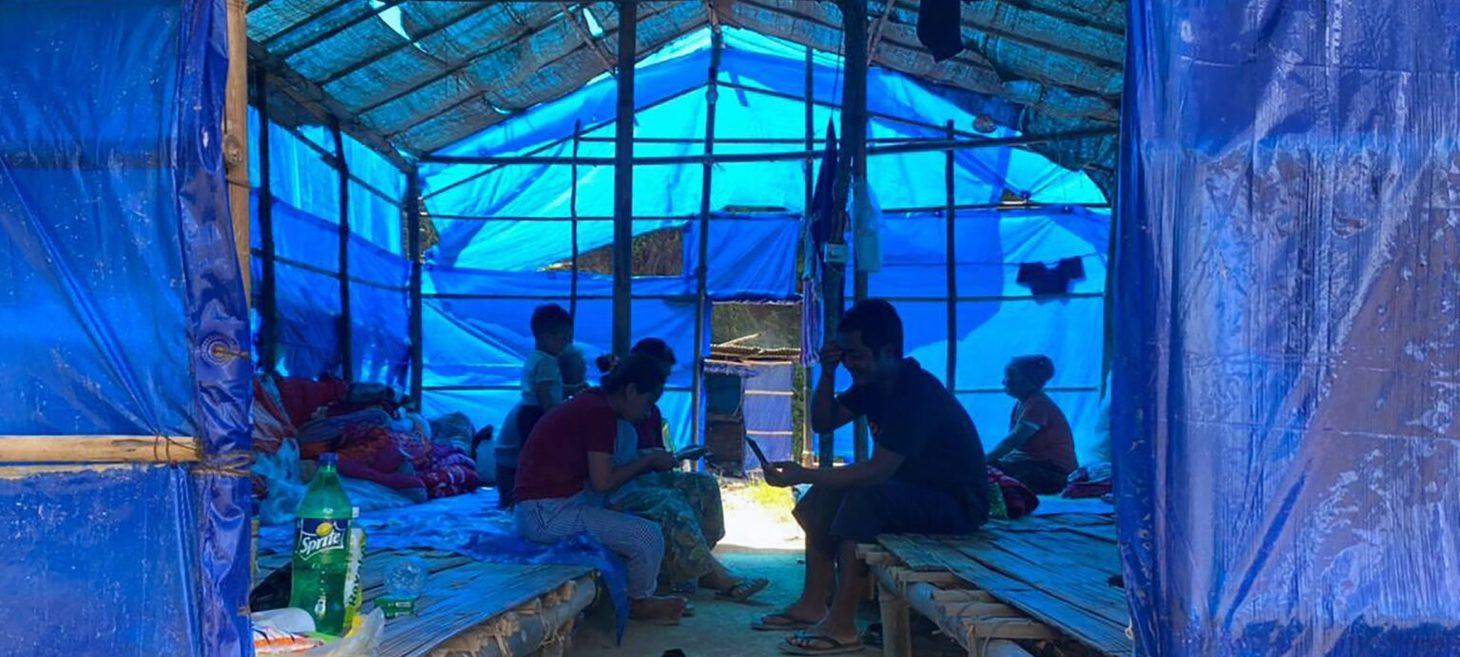Introduction & Analysis
This collection of open-source English-language news articles published over the past week highlights significant events and issues concerning Myanmar. They present a snapshot of the safety and security landscape in Myanmar.
Intensification and Expansion of Armed Conflict:
The Arakan Army (AA) has renewed its attacks on the Myanmar junta's naval base in Kyaukphyu Township, Rakhine State, after a significant period of relative calm. This offensive targeted the naval base, surrounding military outposts, and a police battalion.
The AA has expanded its operations into regions bordering Rakhine State, broadening the conflict's geographical scope.
Clashes reportedly continued intermittently around the Kyaukphyu naval base, resuming on Wednesday, March 5, 2025. Both sides have exchanged artillery fire.
Other ethnic armed organizations (EAOs) are also actively engaged in conflict with the junta. For example, the Karenni Nationalities Defense Force (KNDF) is engaged in escalating clashes with regime troops attempting to retake Mobye town in southern Shan State, near the Karenni State border.
The Kachin Independence Army (KIA) has been repeatedly targeted by the Myanmar military in KIA-controlled territories, including Laiza, with aircraft and drones, as the KIA pushes to take Bhamo in southern Kachin State.
Overall, resistance leaders and ethnic armed groups are estimated to control half of the country's territory, with the State Administration Council (SAC) controlling less than half.
Junta's Military Actions and Tactics:
The junta is employing airstrikes and artillery fire extensively in response to the EAO offensives. Airstrikes have been reported on approximately 10 villages near the Kyaukphyu naval base, displacing residents. Specific villages mentioned include U Kin, Kyan Chai, Saing Chong, Saing Chong Don, Shauk Chaung, Si Maw, Kat Thabyay, and Pya Tae.
There are serious concerns regarding the junta's use of highly destructive weaponry, including thermobaric bombs, which are reportedly being used indiscriminately against both civilian and military targets.
The junta's implementation of the National Service Law, leading to forced conscription, is a significant factor contributing to insecurity and a human resource crisis. There are reports of young people being arrested and ransoms demanded from their families to avoid conscription.
Disturbingly, there are reports that Myanmar nationals deported from Thailand are being forcibly conscripted into the junta's forces. These individuals are allegedly being sent for mandatory military service, with concerns that they may be used as human shields and for landmine clearance.
The junta has also been reported to have seized dozens of monasteries across Naypyitaw, turning religious buildings into military barracks.
Growing Influence and Security Presence of China:
The junta's passage of the Private Security Services Law allows armed Chinese security firms to operate in Myanmar to protect Beijing's interests, particularly its Belt and Road Initiative projects in Kyaukphyu. This has raised concerns about Myanmar's sovereignty and the potential for increased instability.
China's economic interests, including the Kyaukphyu deep-sea port and oil and gas pipelines, are significant drivers of its involvement in Myanmar. These projects are located in conflict-affected areas, leading to China's desire for stability.
China has been actively pressuring ethnic armed groups near its border, including the Brotherhood Alliance, to stop fighting the regime and engage in peace talks. This intervention in Myanmar's internal affairs has drawn criticism.
Worsening Humanitarian Crisis:
The ongoing armed conflict has led to widespread displacement of civilians, with many fleeing their villages due to fighting and airstrikes.
Internally displaced persons (IDPs) are facing dire shortages of medicine and other essential humanitarian supplies.
The freeze on USAID aid is reported to have severely impacted vulnerable communities and halted critical humanitarian programs.
Cyber Scam Centers and Border Insecurity:
The Thai-Myanmar border region continues to be a significant area of insecurity due to the prevalence of online scam centers that rely on forced labor.
While Thai authorities have initiated crackdowns, the illicit industry persists, often involving Chinese criminal elements and Myanmar militias.
The situation creates a nexus of human trafficking, forced labor, and cross-border crime, further destabilizing the region.
Digital Repression and Surveillance:
The junta maintains a tight grip on the digital space through internet shutdowns, advanced surveillance, and censorship.
The ongoing implementation of the e-ID project, allegedly with Indian expertise and biometric data-collecting tools, along with technical support from China for a national census, raises serious concerns about increased surveillance and tracking of dissidents.
International Relations and Involvement:
Thailand is facing increasing pressure regarding its handling of Myanmar migrants and the issue of cyber scam centers along its border. There is criticism regarding the deportation of Myanmar nationals who are subsequently forcibly conscripted by the junta.
The Myanmar junta is strengthening its relationship with Russia, as the junta chief travels to Moscow. Russia has become a crucial oil supplier and a major supporter of the junta's military, especially its air force.
The United States has the opportunity to play a role in addressing the crisis by supporting the pro-democracy movement and pushing back against China's growing influence.
Conflict
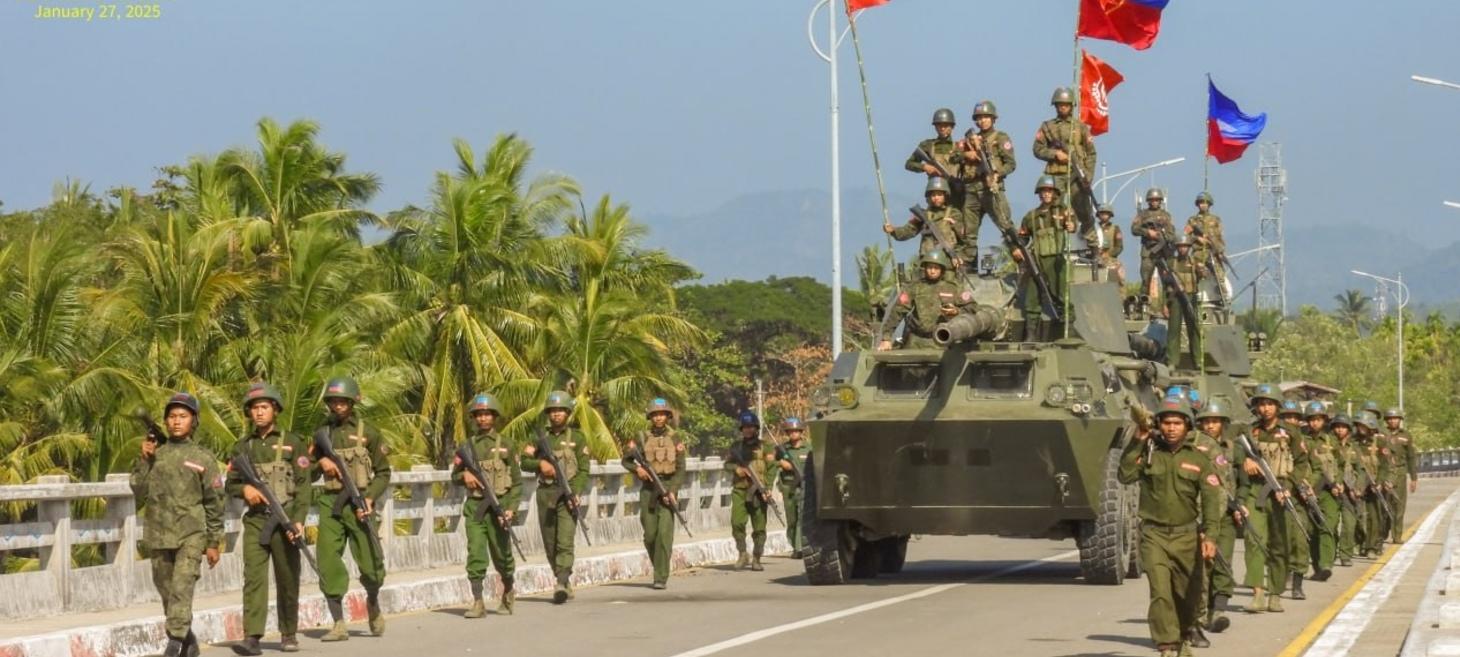
Arakan Army, allies attack Myanmar military in regions bordering Rakhine State
Since late 2023, the powerful Arakan Army (AA) has captured most townships in Rakhine State from the Myanmar military. Expanding their offensive, the AA has now advanced into the neighboring regions of Bago, Pathein (in Ayeyarwady Region), and Magway. In a statement released on February 27, 2025, the AA confirmed the seizure of junta camps in these regions, specifically in Bago Region’s Padaung Township, Ayeyarwady Region’s Pathein Township, and Magway Region’s Ngape Township, with the assistance of allied resistance groups. Military analysts suggest that the intensified fighting on roads running through the Arakan Hills (also called the Rakhine Yoma) appears to be aimed at cutting off the military regime’s vital communication and supply lines to Myanmar’s central plains.
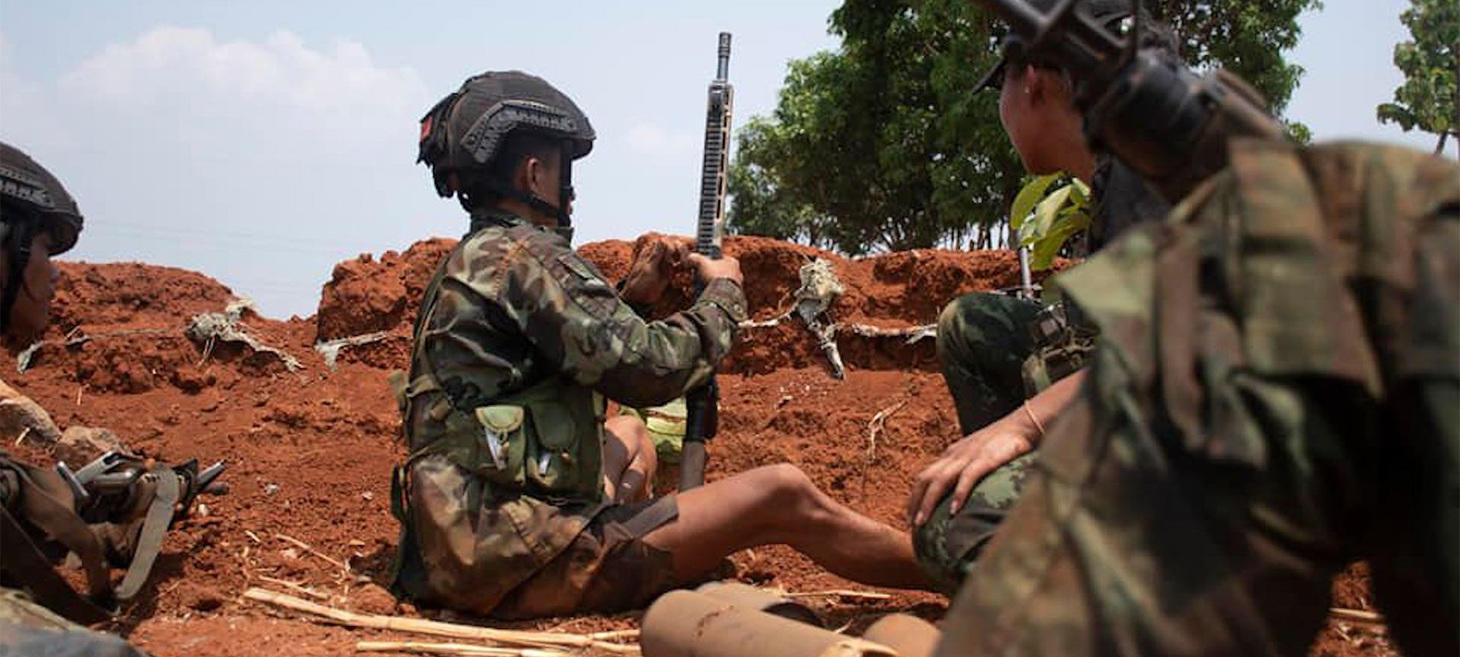
Karenni Resistance Reports Heavy Clashes as Myanmar Junta Pushes to Reclaim Mobye
Clashes between the Myanmar junta forces and the Karenni Nationalities Defense Force (KNDF) are escalating as the junta attempts to retake Mobye town in Pekon Township, southern Shan State, on the Karenni State border. Junta reinforcements are arriving, and Light Infantry Battalion 422 is bombarding the nearly deserted town with artillery, causing civilian casualties and the destruction of buildings. The KNDF, a coalition of Karenni armed groups formed after the 2021 coup, has been holding Mobye since early last year. While fighting has occurred in other Karenni townships, Mobye has seen the heaviest clashes, resulting in significant casualties for both sides, although the KNDF reported taking care of some surrendered and fleeing junta soldiers. The junta's push to retake Mobye, which lies between Loikaw and southern Shan State, has involved deploying new conscripts and the allied Pa-O National Army. Karenni resistance forces had seized most of Pekon Township, including Mobye, early last year.
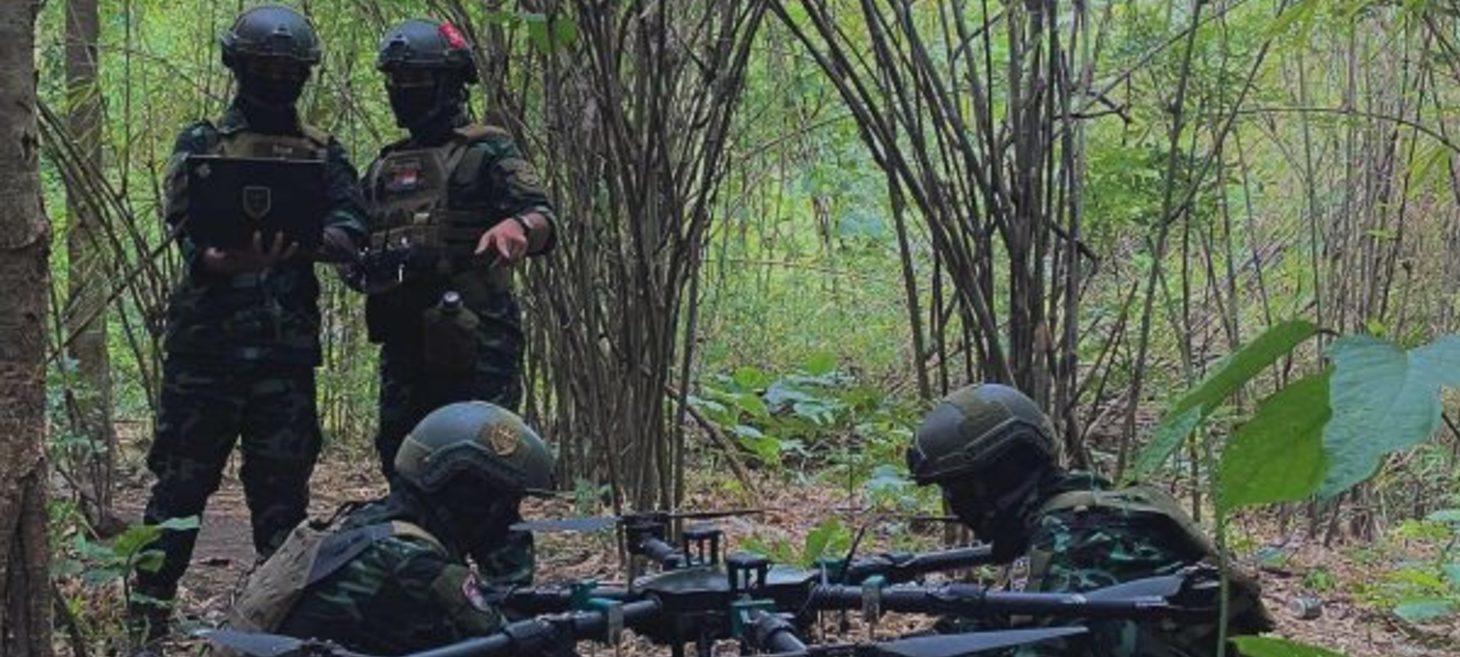
The Impact of Technological Weapons in the Myanmar Conflict
In the Myanmar conflict, technology has become a crucial factor, with resistance groups increasingly utilizing weaponized commercial and 3D-printed drones for targeted bombings, surveillance, and psychological warfare against the Tatmadaw. These low-cost solutions allow insurgents to bypass difficult terrain and strike military targets, significantly disrupting the Tatmadaw's operations. Similarly, 3D-printing has provided a means for resistance forces to manufacture firearms and weapon components, addressing weapon shortages. While 3D-printed firearms serve as a supplementary advantage, drones have demonstrated a more profound operational impact, prompting the Tatmadaw to also adopt drones and countermeasures, indicating an ongoing technological arms race. The adoption of these technologies, driven by a tech-savvy younger generation and inspired by conflicts like the one in Ukraine, highlights a shift in modern warfare tactics and could inspire other insurgent groups globally.
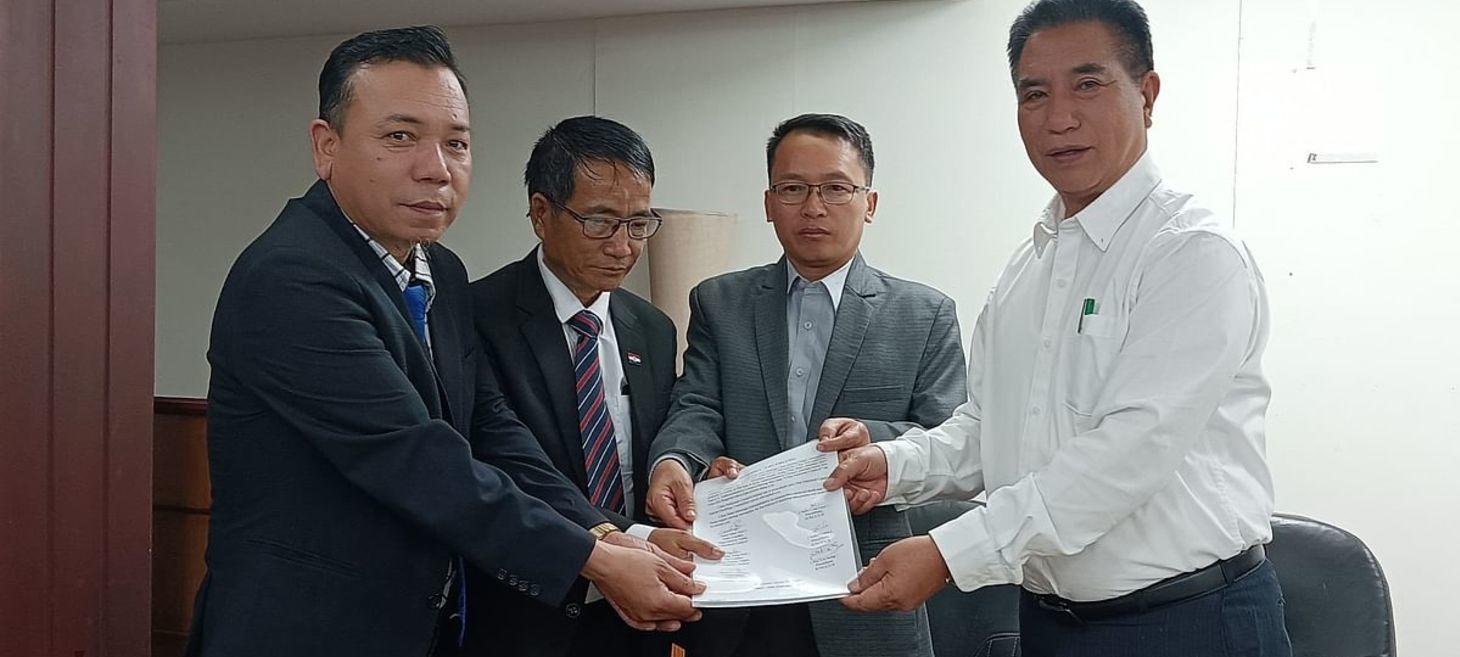
Myanmar's Chin 'rebel groups' unite in Mizoram in CM Lalduhoma's presence to announce 'merger' agreement
Myanmar's Chin 'rebel groups' united in Mizoram and announced a 'merger' agreement. The event took place in the presence of Mizoram's Chief Minister Lalduhoma, who, when questioned about his attendance, stated, "It is my mission", without providing further explanation. The news of this unification was published on 04 March 2025.
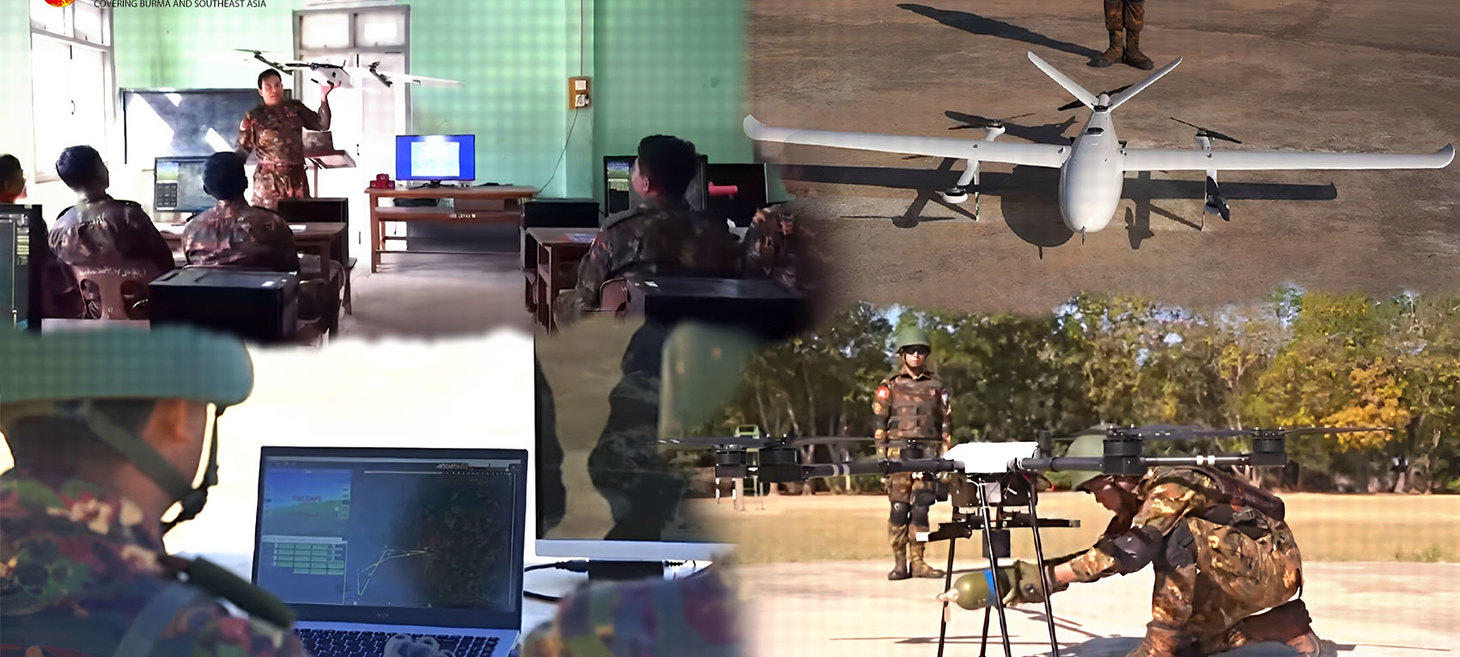
‘Made in China’: Inside the Myanmar Junta’s Intensifying Drone Offensive
Since late 2014, the Myanmar military regime has deployed large numbers of drones in key front-line battlefields, intensifying this use since mid-2024. These drones, predominantly Chinese-made VTOL models, including the CH4 Rainbow, CH3A, and Yellow Cat, are used for offensive and reconnaissance purposes, targeting both military and civilian targets. The regime increased drone deployment after losing territory in northern Shan State in 2023. China also provides training to Myanmar military personnel on arms manufacturing and drone operation, with some training occurring in Tianjin. A captured drone was tested in Tianjin, and a drone unit was formed within the Army's Operations Department in early 2024, led by Brigadier-General Nay Myo Tun. While ethnic armed organizations have reported the junta's use of Chinese drones to the Chinese government, China has denied direct sales.
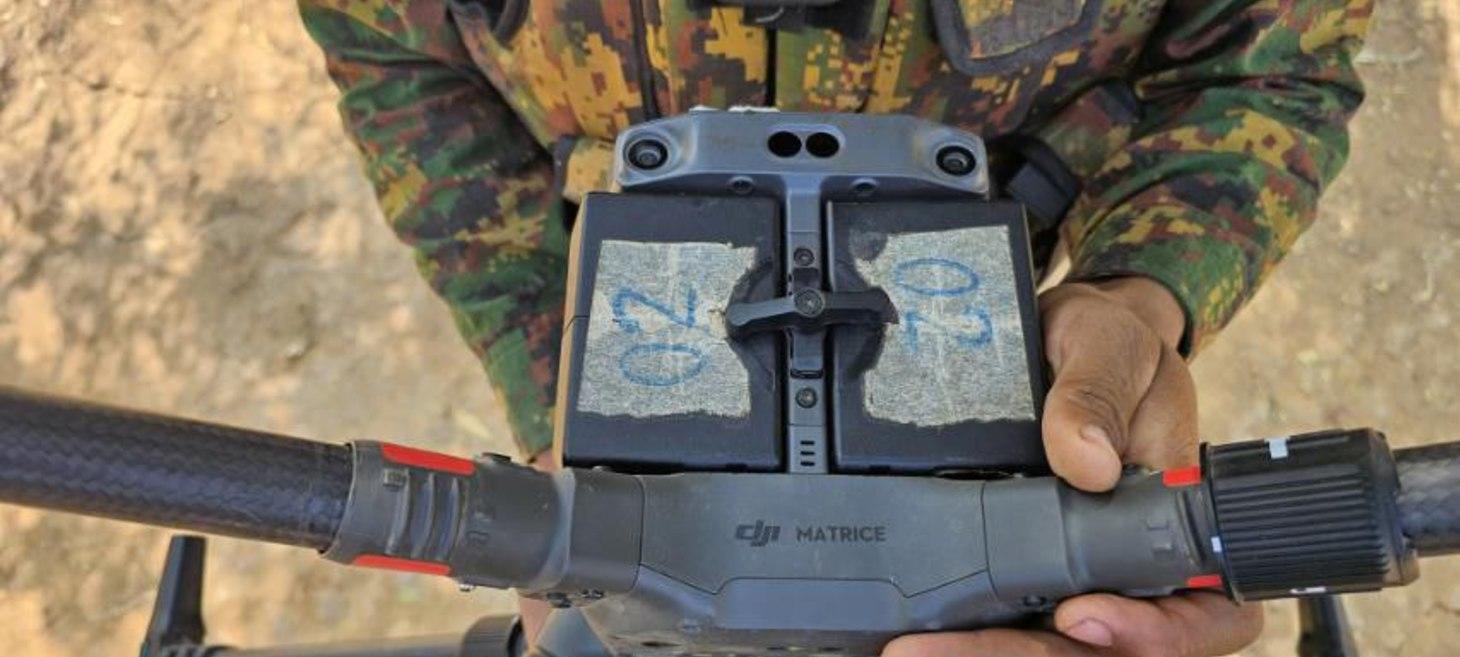
Myanmar military attacks KIA-controlled territories, including Laiza, with aircraft and drones
The Myanmar military has been actively targeting areas under the control of the Kachin Independence Army (KIA), including near their headquarters in Laiza and in KIA-controlled parts of Hpakant Township, in response to the KIA's efforts to seize the city of Bhamo in southern Kachin State. These attacks, which have also occurred in Shwegu Township and near Manweingyi on the Chinese border, involved the use of aircraft and drones. For example, on Tuesday, three drones were launched near Laiza, with two kamikaze drones falling north of the town in an area with few homes and another landing near Laisin village, resulting in no reported casualties. These military actions are part of the ongoing conflict between the junta and various armed groups in Myanmar.

Arakan Army Renews Attacks on Kyaukphyu Naval Base
The Arakan Army (AA) has renewed its attacks on the Myanmar junta's Danyawaddy naval base in Kyaukphyu Township, Rakhine State, after over a year without such offensives. These attacks, which began on February 20 and resumed on Wednesday after a pause, involve artillery fire and junta airstrikes on surrounding areas, causing displacement of residents and damage to civilian buildings in villages near the base. Kyaukphyu is strategically important due to the presence of Chinese-backed mega projects like oil and gas pipelines and a deep seaport, and it is one of the few remaining areas under junta control in Rakhine State along with Sittwe and Manaung. The resumption of fighting coincides with the junta's passage of a law allowing Chinese armed security firms to operate in Myanmar to protect their interests, including projects in Kyaukphyu. The AA is also attacking Sittwe, leading to bank closures and restrictions on residents' movement, while the junta is reinforcing Kyaukphyu and Manaung.
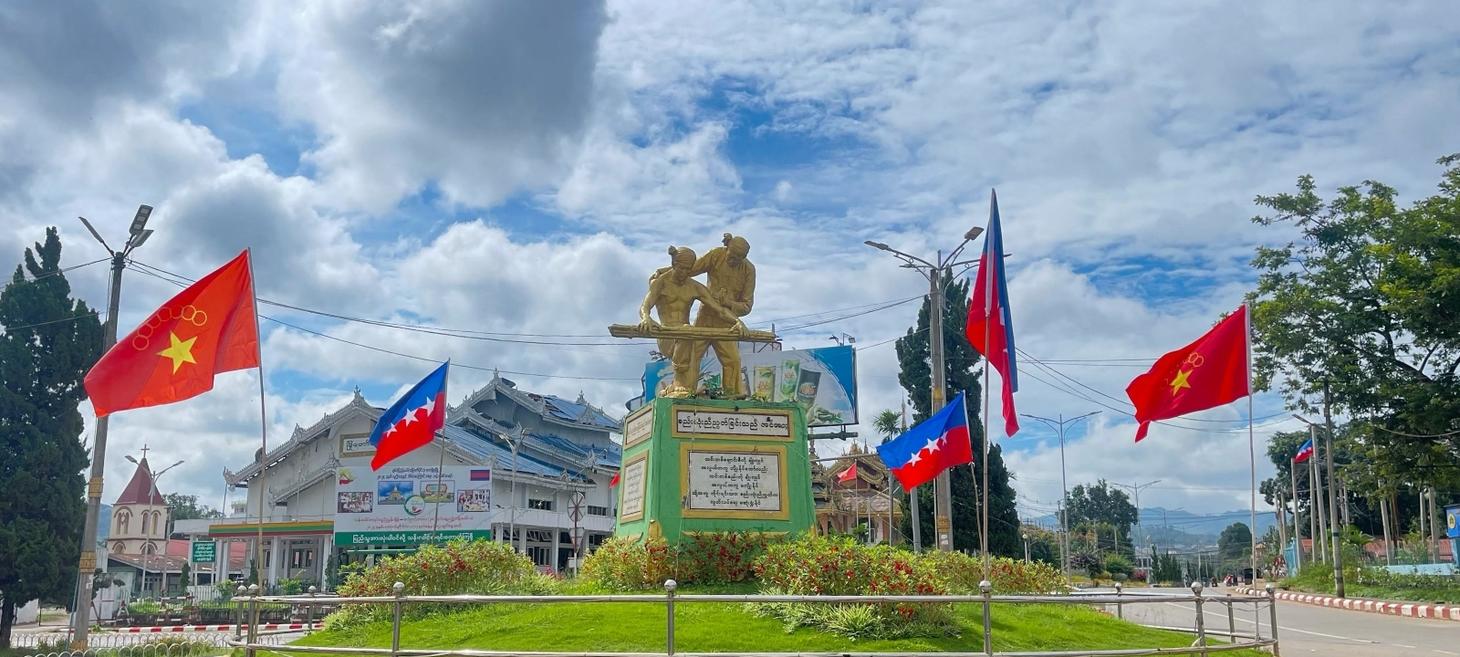
Uncertain fate: Lashio rebuilds as questions of control loom
The Myanmar National Democratic Alliance Army (MNDAA) gained control of Lashio in northern Shan State in August 2024 after fierce fighting with the junta, causing significant infrastructural damage and prompting many residents to flee. The subsequent five-month campaign of airstrikes by the regime and a Chinese blockade further hindered the MNDAA's efforts to rebuild and establish administration. Following a ceasefire agreement brokered by China in late January, reconstruction has progressed, with residents slowly returning and markets reopening, and the MNDAA has been working to restore electricity and operate the general hospital, though challenges remain in providing consistent power and comprehensive healthcare. Despite these efforts, the future of Lashio remains uncertain due to conflicting reports about whether the MNDAA will withdraw, leading to mixed feelings among residents who acknowledge some improvements under MNDAA rule but fear a return to fighting.
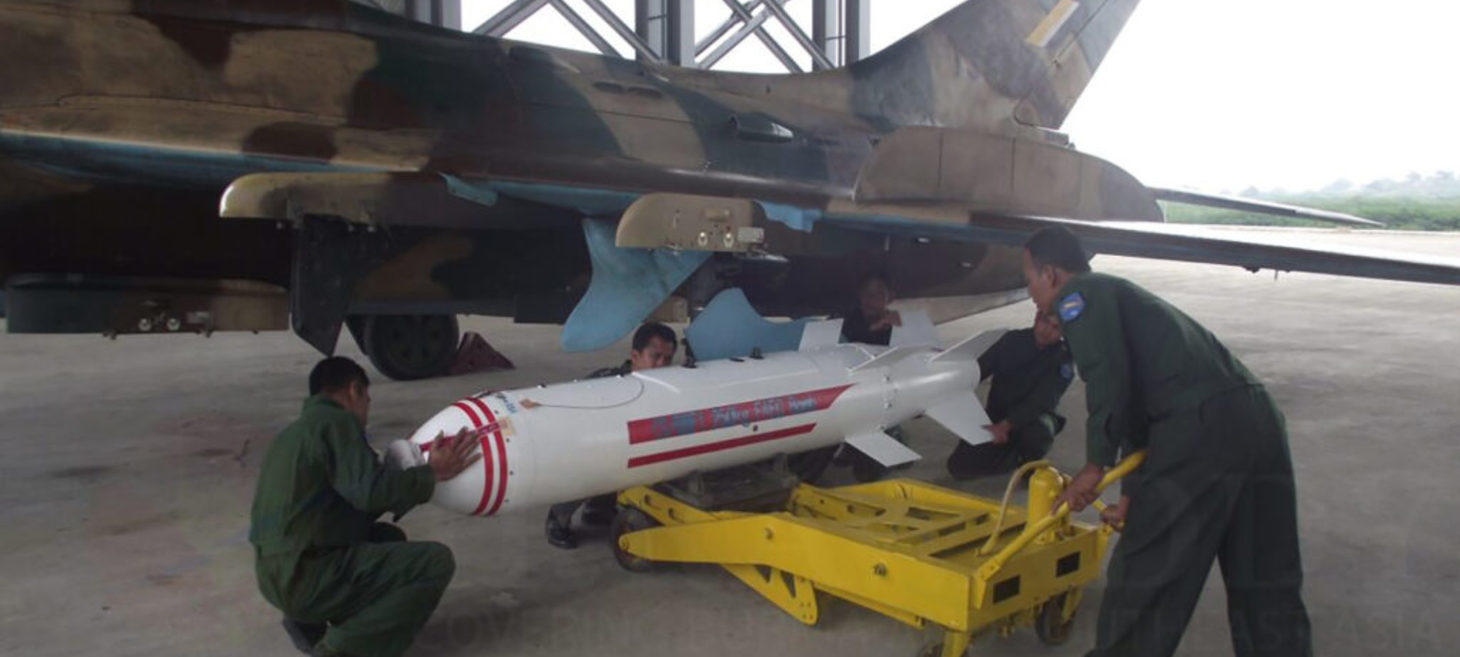
Myanmar Junta Using Devastating Thermobaric Bombs Indiscriminately: EAOs, Experts
The Myanmar junta has been using devastating thermobaric bombs indiscriminately against both civilian and military targets in various regions including Shan, Chin, Kachin States, and Sagaing Region. These bombs, also known as aerosol bombs, are more destructive than conventional high-explosive bombs, utilizing a fuel mixture that disperses and then detonates, creating a massive blast wave, fireball, and a vacuum that can cause suffocation even in enclosed spaces. The junta employs both air-dropped thermobaric bombs, acquired from China, and domestically produced thermobaric rocket-propelled grenades, which are manufactured using Russian technology. Reports indicate that the junta has used these weapons even before the 2021 coup, and their use has been linked to significant casualties, such as in the Pazi Gyi Village attack in 2023.
Conscription
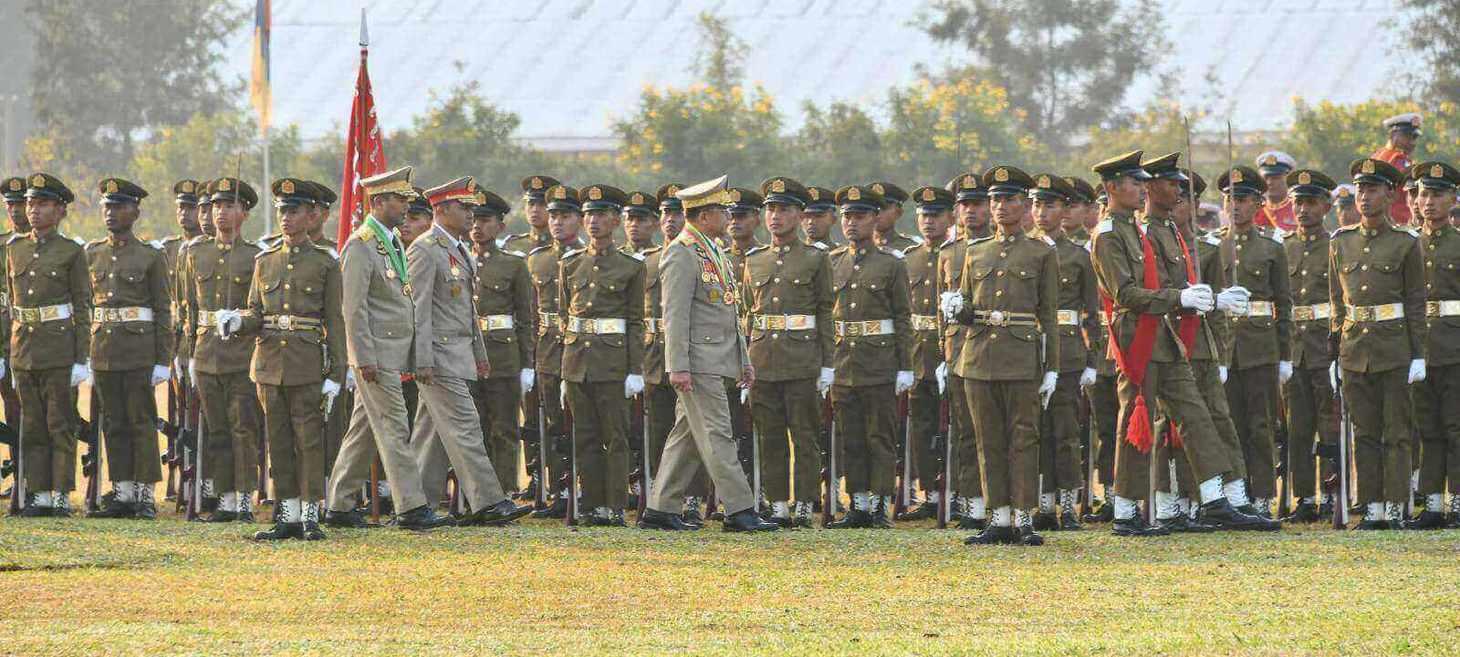
FORCED CONSCRIPTION LEADS TO SUCIDAL PROTEST WAVE: All stakeholders interested only in youth becoming cannon fodders
The military junta (State Administration Council - SAC) in Myanmar implemented a forced conscription law, leading to widespread dismay and resistance from the population, despite the anti-junta National Unity Government's (NUG) efforts to counter it. Facing recruitment quotas, the junta's enforcers have met resistance, including killings of administrators involved in the process, and reports indicate ransom schemes to avoid conscription are becoming less available in some areas. Tragically, this forced conscription has resulted in a wave of suicidal protests by young individuals unwilling to serve in the junta's army, viewing it as a "bad luck lottery". The article notes that while international law views conscription as a state's sovereign right, the legitimacy of the junta's actions is questionable in the context of an internal conflict, with more than half the country controlled by anti-junta groups, and the forced recruitment has significantly devastated the social fabric and traumatized the population.
Crime & Narcotics
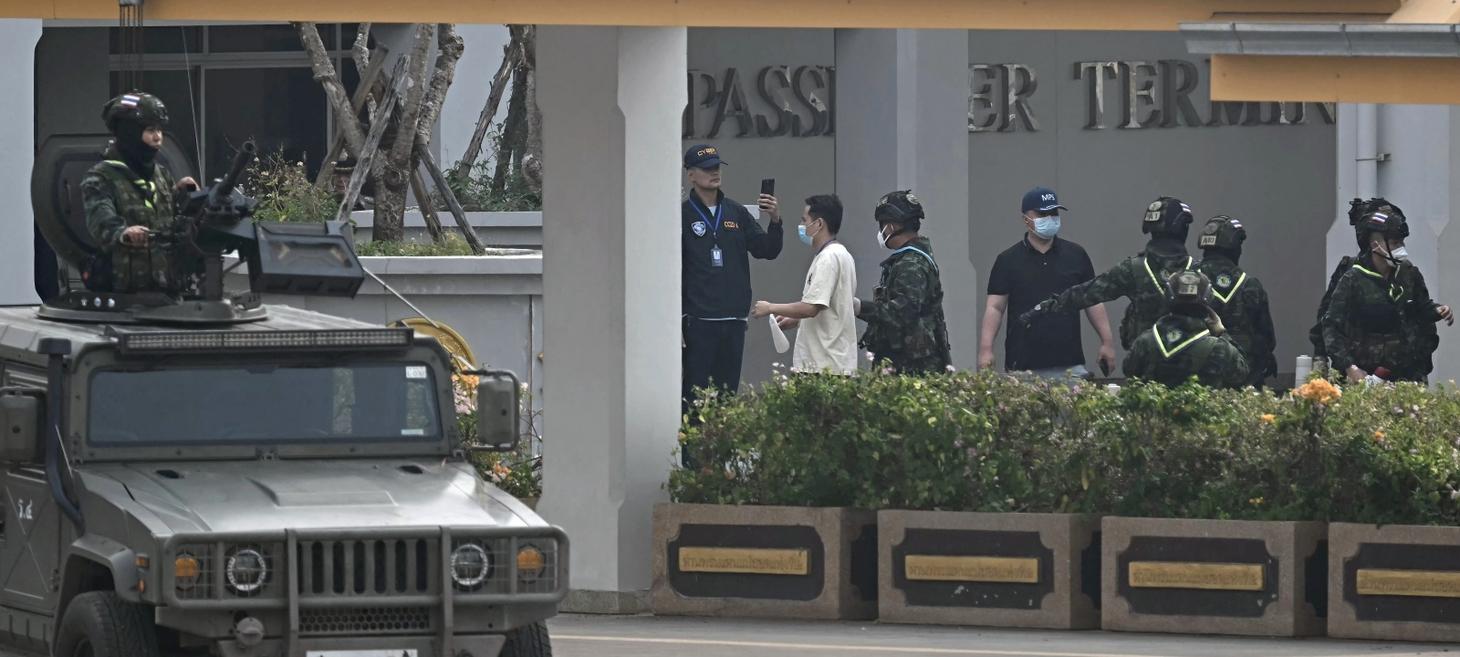
Final crackdown? Thailand moves against Myanmar cyber scam centres
Under pressure from domestic and international entities, including China, Thailand has initiated a crackdown on cyber scam centers located across its border in Myanmar, which exploit trafficked foreigners. This action involves cutting off electricity and telecommunications to key areas and restricting the export of essential supplies. While hundreds of scam workers have been released, experts caution that powerful vested interests, including criminal syndicates, local businesses, and even some authorities, might impede the long-term success of these measures. The crackdown has resulted in fuel shortages in Myanmar and increased police harassment of undocumented Myanmar migrants in Thailand. Despite these efforts, some observers believe that Thailand needs to target the underlying organized crime structures to effectively dismantle these scam operations that generate billions of dollars annually.
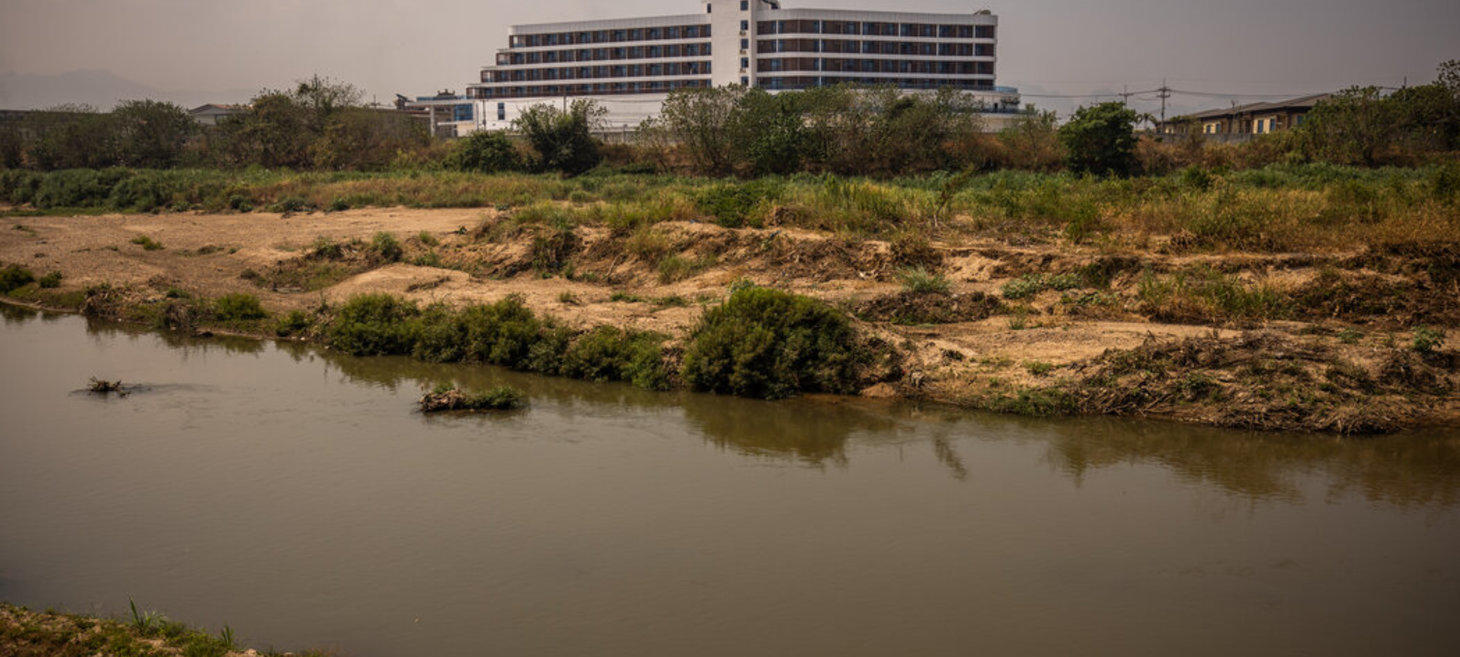
Why Scam Centers in Southeast Asia Keep Flourishing
Online scam mills utilizing forced labor have proliferated along the Myanmar-Thailand border, a lawless region exploited by Chinese criminal syndicates following the 2021 Myanmar coup. These operations, housed in modern tower blocks, defraud victims worldwide through various online scams, forcing trafficked individuals from at least 40 nations, often lured by false promises, to participate and subjecting them to torture and abuse. Despite recent multinational rescue efforts and claims of a crackdown, these scam centers continue to operate and expand, with thousands still trapped and major criminal players remaining at large. The persistence of this issue is attributed to deep-rooted problems such as governance failures, corruption, and the entanglement of organized crime with political and economic interests in the region.
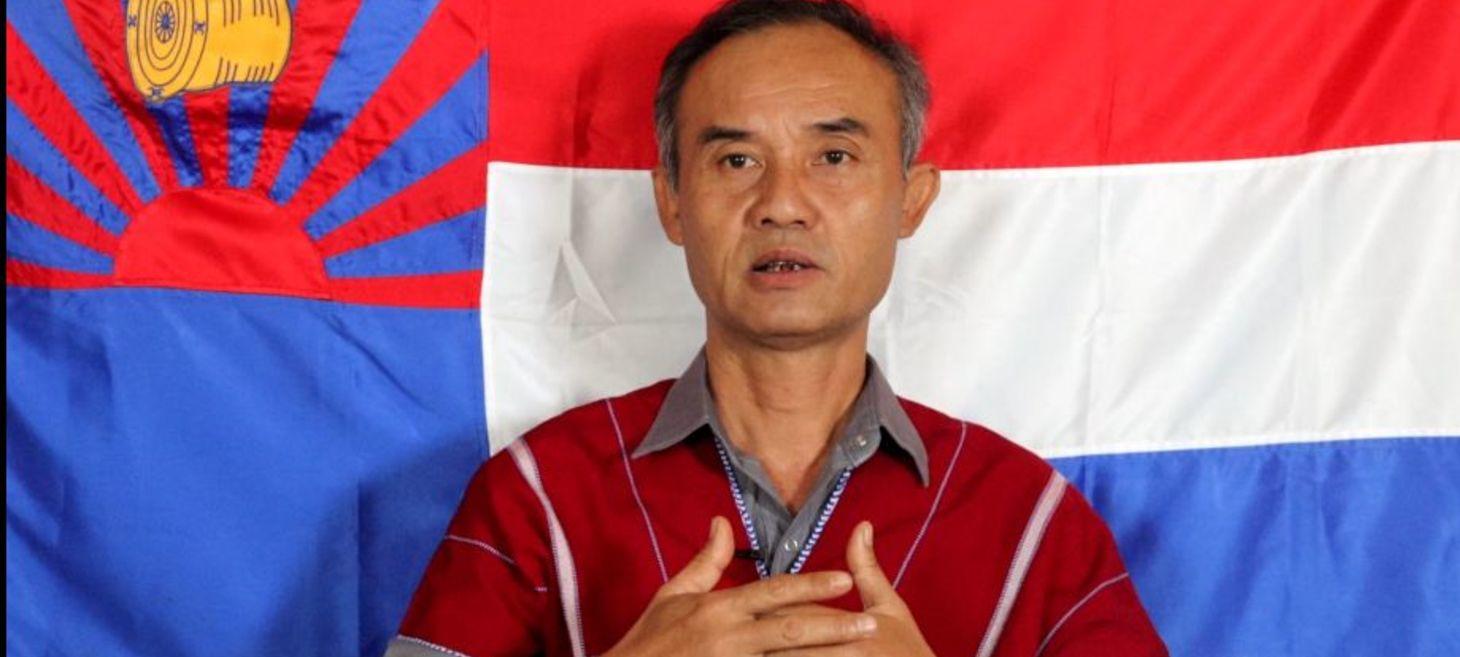
KNU: Junta May Use Scam Centre Crackdown to Undermine the Revolution - Burma News International
The Karen National Union (KNU) has expressed concern that the junta in Burma may exploit the international crackdown on scam centers, particularly those in Karen State run by junta-aligned Karen Border Guard Force (BGF) and the Democratic Karen Benevolent Army (DKBA), to undermine the ongoing revolution. This follows calls from the Thai and Chinese governments for more pressure on groups involved in these scam centers (Zhapian) and credible reports of KNU involvement with the KK Park scam center, which drew criticism. KNU spokesperson Padoh Saw Kler Say emphasized the need for vigilance, providing accurate information to the international community about the true extent of these businesses, and preparing protective measures to counter the junta's potential attempts to discredit the revolution by linking it to scam operations. He also suggested that the Karen EAOs should consult with international and Karen experts and break away from the junta's strategies when setting up their enforcement units against scams and human trafficking. Justice for Myanmar (JFM) has also accused the junta of involvement in scam centers and using the profits to fund their operations.
Economy
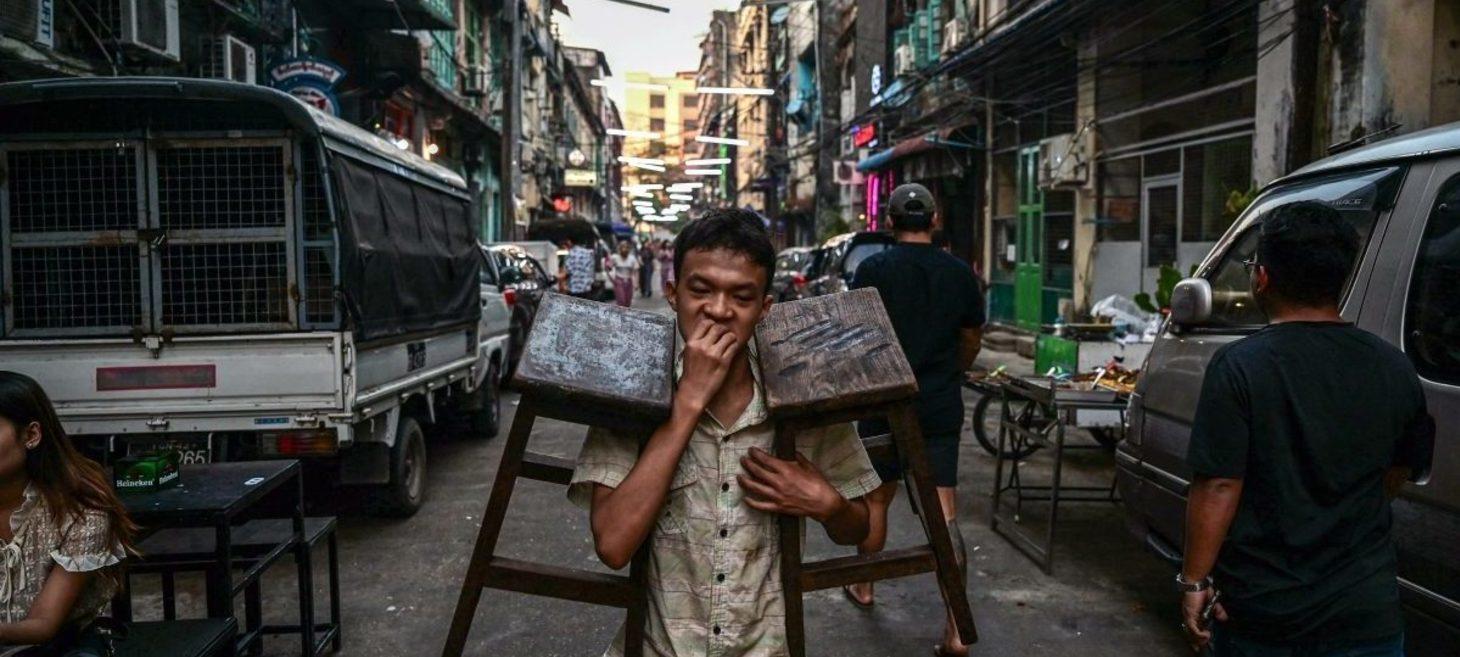
Myanmar’s Worsening Human Resource Crisis - fulcrum.sg
Myanmar is facing a worsening human resource crisis due to four years of civil strife, conflict, and the activation of the National Service Law, which prohibits young people from leaving the country and has exacerbated the mass exodus that began post-coup. This has resulted in significant labor shortages across various domestic industries, leading to a shrinking economy and slowed development. The conscription laws, decreasing opportunities, and insecurity, along with the withdrawal of foreign firms and declining investment, have compelled many to seek employment abroad. Consequently, industries like agriculture, manufacturing, and services are struggling with recruitment, and the problem of child labor has resurfaced. Furthermore, the SAC's policies, which prioritize military success and target CDM participants, have severely impacted the healthcare and education sectors, diminishing their quality and hindering development. While remittances from overseas workers offer some economic support, the significant departure of human capital has substantially shrunk Myanmar's GDP.
Foreign Affairs
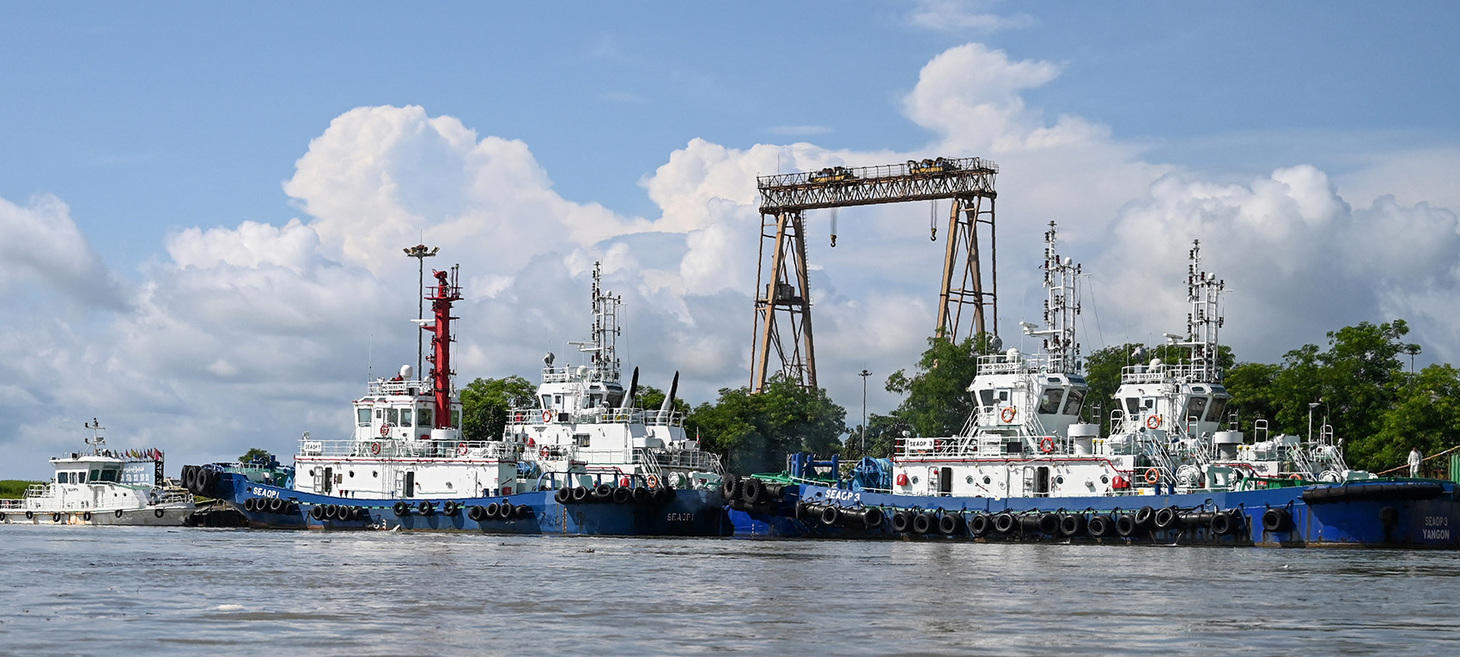
China’s CITIC and Myanmar Junta Discuss Progress on Rakhine Deep-Sea Port
Executives from Chinese state-owned CITIC met with Myanmar junta officials in March 2025 to push for the swift implementation of the Kyaukphyu Special Economic Zone and deep-sea port, a crucial part of China's Belt and Road Initiative offering direct access to the Indian Ocean. Despite much of Rakhine State, where Kyaukphyu is located, being under the control of the ethnic Arakan Army (AA), the two sides discussed expediting the project and agreed to update the development plan to suit the current situation. Their discussions included environmental and social impact assessments, and development timelines, with the junta claiming efforts to complete necessary tasks ahead of the extended deadline of June 2025. China has been pressing the junta to initiate the project, even after the 2021 coup, and the recent passage of Myanmar's Private Security Services Law, allowing Chinese security companies, underscores China's commitment to protecting its investments in the strategically important region, which is also the starting point of the China-Myanmar pipeline.
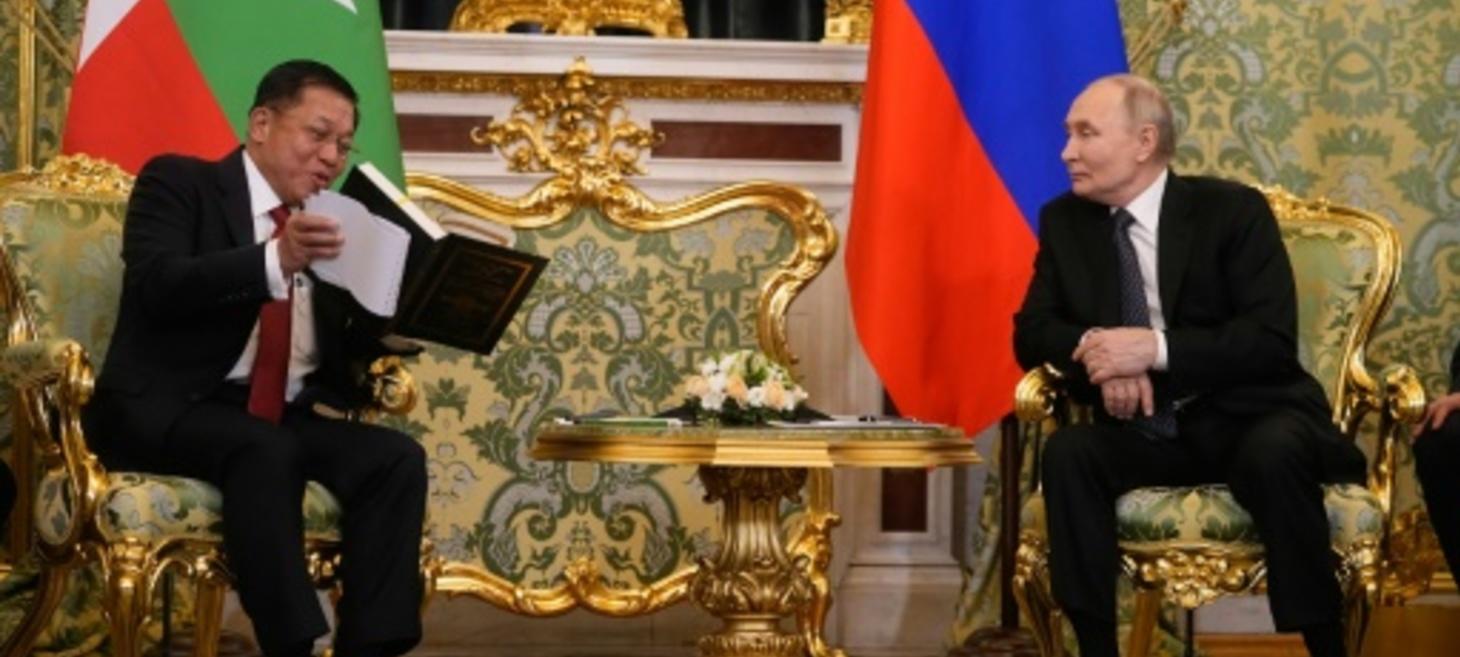
Putin hails Myanmar ties as junta chief visits Moscow
During a visit to Moscow, Russian President Vladimir Putin praised the growing relationship between Russia and Myanmar during a meeting with junta chief Min Aung Hlaing. Putin highlighted the potential for increased trade and specifically mentioned a plan for Russia to assist in building a small nuclear power plant in Myanmar to provide cheap and ecologically safe energy. A memorandum of cooperation for a plant with a capacity that could reach 330 megawatts was signed between the two countries. Min Aung Hlaing, who took power in a 2021 coup, expressed his support for Putin's actions in Ukraine and hailed him as a "king". Both nations are facing Western sanctions, with Russia being a significant arms supplier and oil provider to Myanmar, which is currently dealing with internal opposition. Since its invasion of Ukraine in 2022, Russia has been actively seeking to strengthen ties with countries holding anti-Western stances.
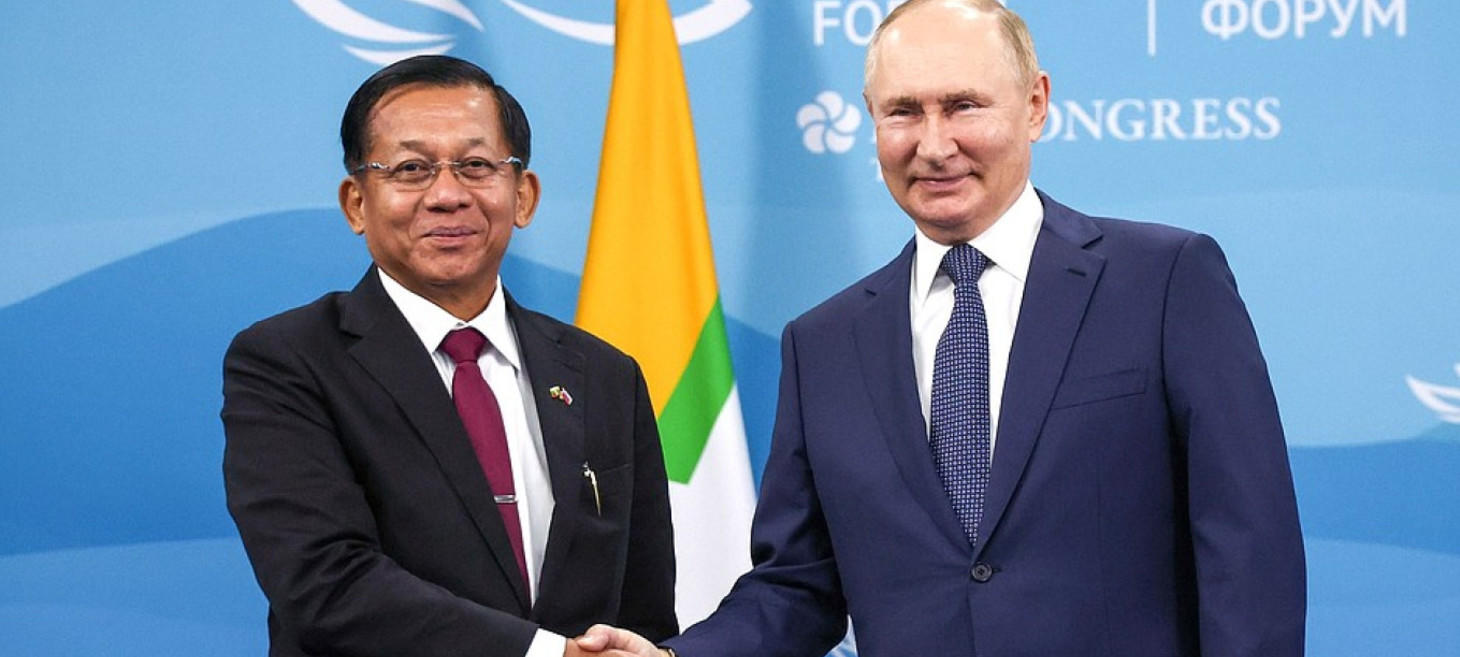
Myanmar junta chief to meet with Russian president in Moscow
Russian President Vladimir Putin is scheduled to host Myanmar junta leader Sen-Gen Min Aung Hlaing in Moscow on March 4 to discuss bilateral ties and international affairs. This meeting highlights the deepening involvement of Russia in Myanmar, including expanded arms sales and investments in development projects. This growing relationship underscores Moscow’s strategy of strengthening ties with governments under Western pressure, as Myanmar’s military regime has faced sanctions and domestic unrest since the 2021 coup. The leaders are expected to conclude intergovernmental agreements and issue a joint statement following their talks. The context of this meeting includes ongoing internal conflict in Myanmar, such as attacks by the Arakan Army and allied forces, and violence perpetrated by the junta, including airstrikes and arson attacks.

Assessing the Oval Office Showdown’s Fallout for Myanmar
The recent Oval Office meeting between US President Donald Trump and Ukrainian President Volodymyr Zelensky, characterized as a "shouting match" where the US appeared to side with Russia, signals a potential shift in the global geopolitical landscape. This event has implications for Myanmar, where the junta, led by Senior General Min Aung Hlaing, has close ties with Russia and China. With a possible rapprochement between the US and Russia, and China closely observing these developments, the Myanmar junta's reliance on these allies might evolve. Consequently, Myanmar's democratic opposition, which had hoped for more US assistance, may need to adjust its strategies and recognize that solely relying on the US for support is no longer a viable approach in this changing international order.
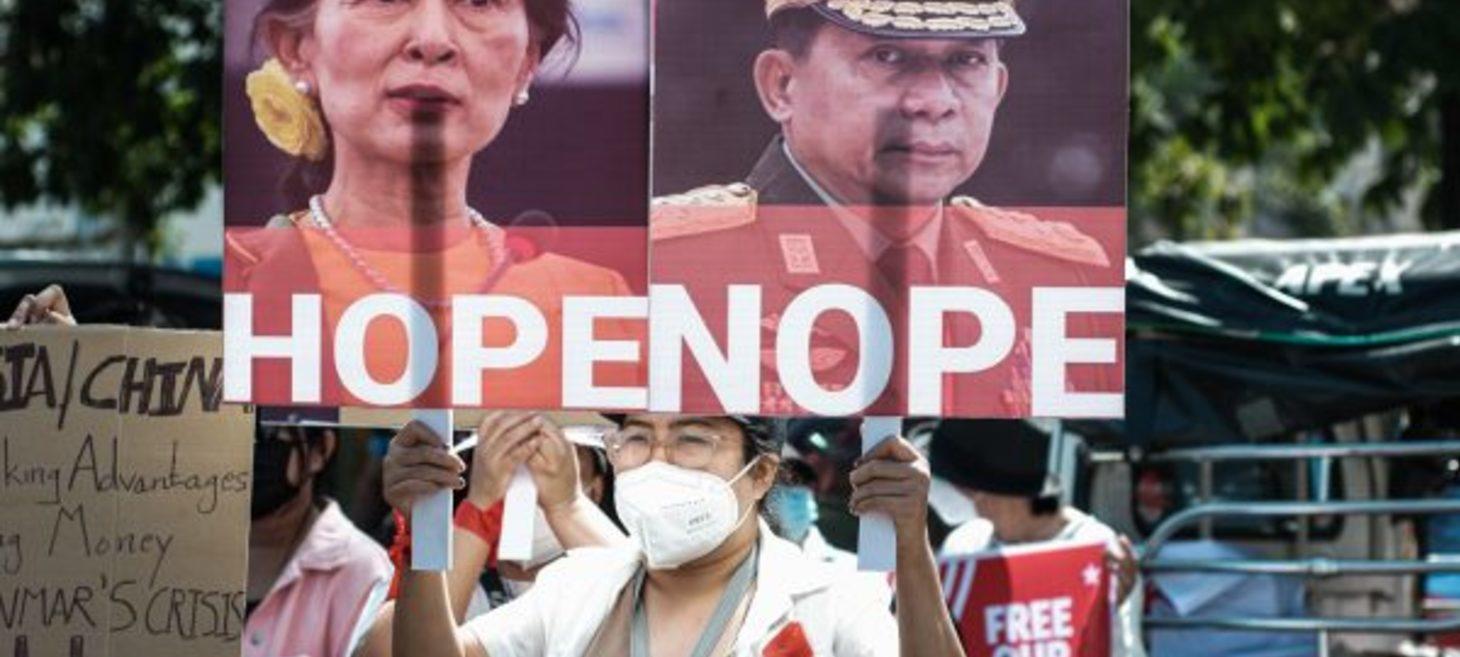
How the US Can Make Myanmar a Foreign Policy Success Story
The article "How the US Can Make Myanmar a Foreign Policy Success Story" argues that the ongoing crisis in Myanmar following the 2021 military coup presents an opportunity for the U.S. to achieve a foreign policy success by supporting the country's pro-democracy movement, lifting the foreign aid freeze, and pushing back against China's growing influence. This approach is presented as both a moral imperative due to the severe humanitarian crisis and violence disproportionately affecting ethnic and religious minorities and a strategic necessity to counter China's increasing control over critical infrastructure and the potential for Chinese private military forces to operate in Myanmar. The author, Salai Za Uk Ling, suggests that U.S. action, potentially spearheaded by Secretary of State Marco Rubio and utilizing existing frameworks like the Burma Act and Executive Order 14014, can protect U.S. geopolitical and economic interests, foster regional stability, and ensure the prevalence of democracy, human rights, and the rule of law in Southeast Asia.
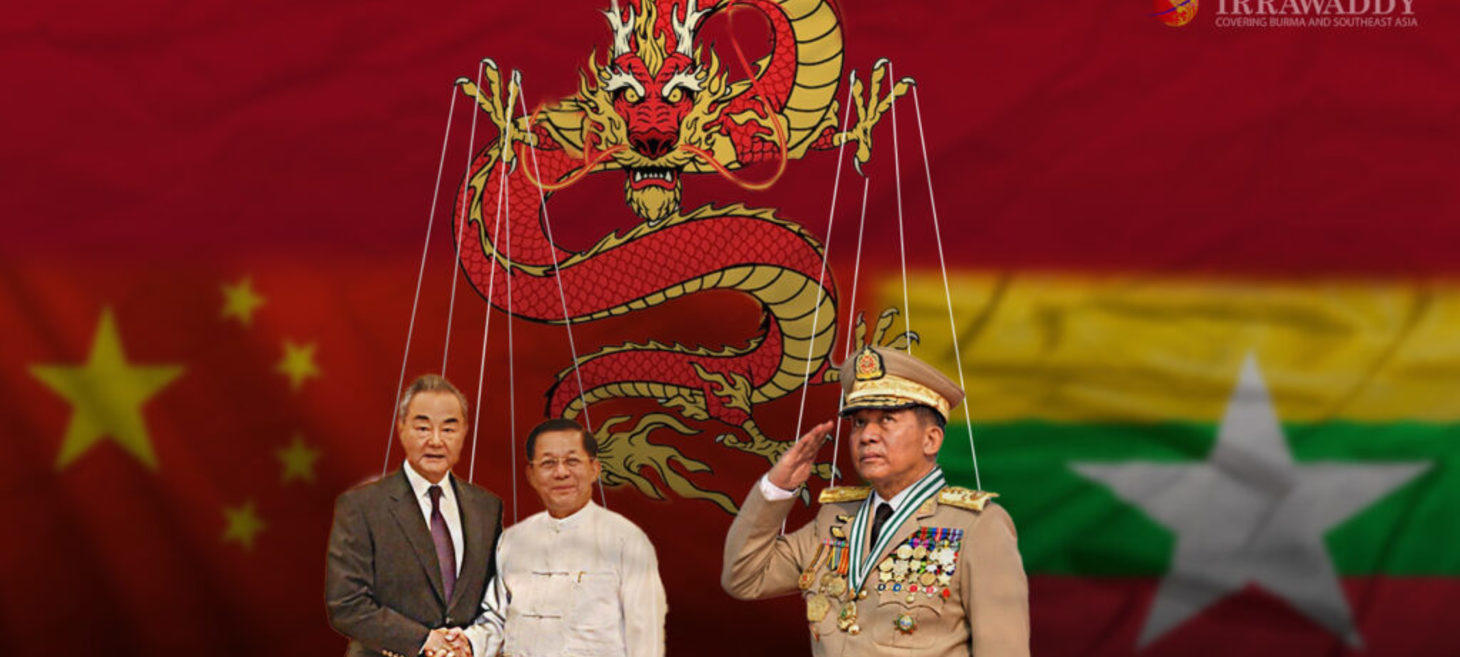
Myanmar Junta Shamelessly Dancing to Beijing’s Tune
Following a series of military setbacks for the Myanmar junta, China's Foreign Minister Wang Yi visited Naypyitaw in August 2024, after which the regime has increasingly aligned itself with Beijing's interests, leading to concerns about Myanmar becoming a puppet state. In exchange for China's support, including backing for its proposed election and opposition to ethnic armed groups, the junta has guaranteed the security of Chinese projects like the oil-and-gas pipeline, agreed to consider a joint security company, and firmly supported Beijing's One China policy. The regime is also prioritizing the China-Myanmar Economic Corridor (CMEC) projects, such as the Kyaukphyu Special Economic Zone and the Muse-Mandalay-Kyaukphyu railway, and controversially declared Chinese New Year a public holiday, sparking criticism of sacrificing Myanmar's sovereignty. Furthermore, the junta passed a law allowing Chinese private security companies, and under Chinese pressure, intervened in the conflict with ethnic rebels, even facilitating ceasefires, while also eventually addressing the issue of rampant Chinese criminal activities in Myanmar. In its efforts to appease China, the junta is also preparing for an influx of Chinese tourists.

Chinese Security Companies Pose Threat to Myanmar’s Sovereignty
A new law in Myanmar allowing Chinese security companies to protect their local interests poses a threat to the country's sovereignty, potentially turning it into a 'client state' of China, according to Dr. Miemie Winn Byrd in an interview with The Irrawaddy. This development is significant in the context of Myanmar's ongoing crisis and the involvement of external powers like China.
Humanitarian
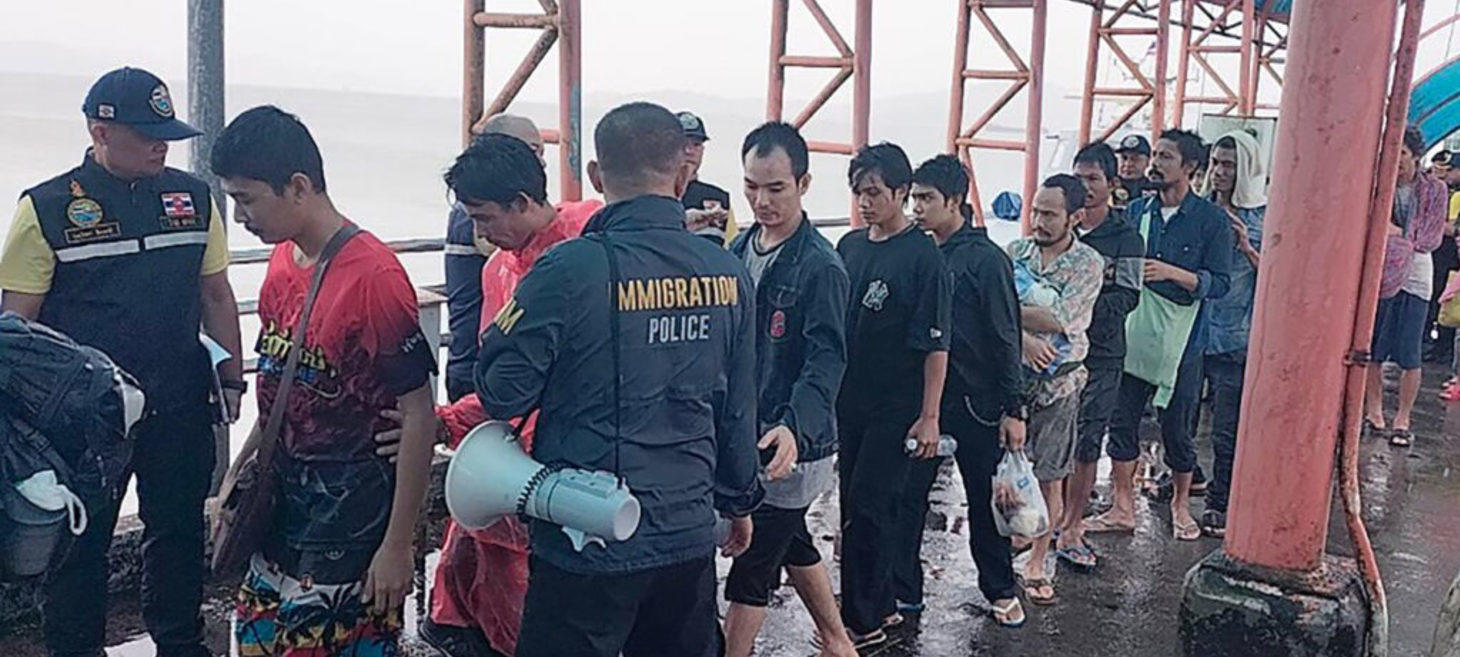
Pressure on Thailand Grows as 200 Myanmar Deportees Fed into Junta War Machine
Facing increasing international criticism, Thailand has deported another 200 Myanmar nationals detained in Ranong to the junta authorities in Kawthaung in late February 2025, with almost all reportedly being forcibly conscripted. This deportation follows an earlier investigation that exposed the Ranong Immigration Center as a recruitment hub for the Myanmar junta, where over 1,500 Myanmar migrants were handed over between June and December 2024. Human rights groups and others have protested these actions, highlighting that these deportees are being put at risk of forced military service, potentially as human shields, after the junta activated its conscription law in February 2024. Despite not being a signatory to the Refugee Convention, Thailand is being urged to offer humanitarian protection and is reminded of its obligations under international human rights treaties.
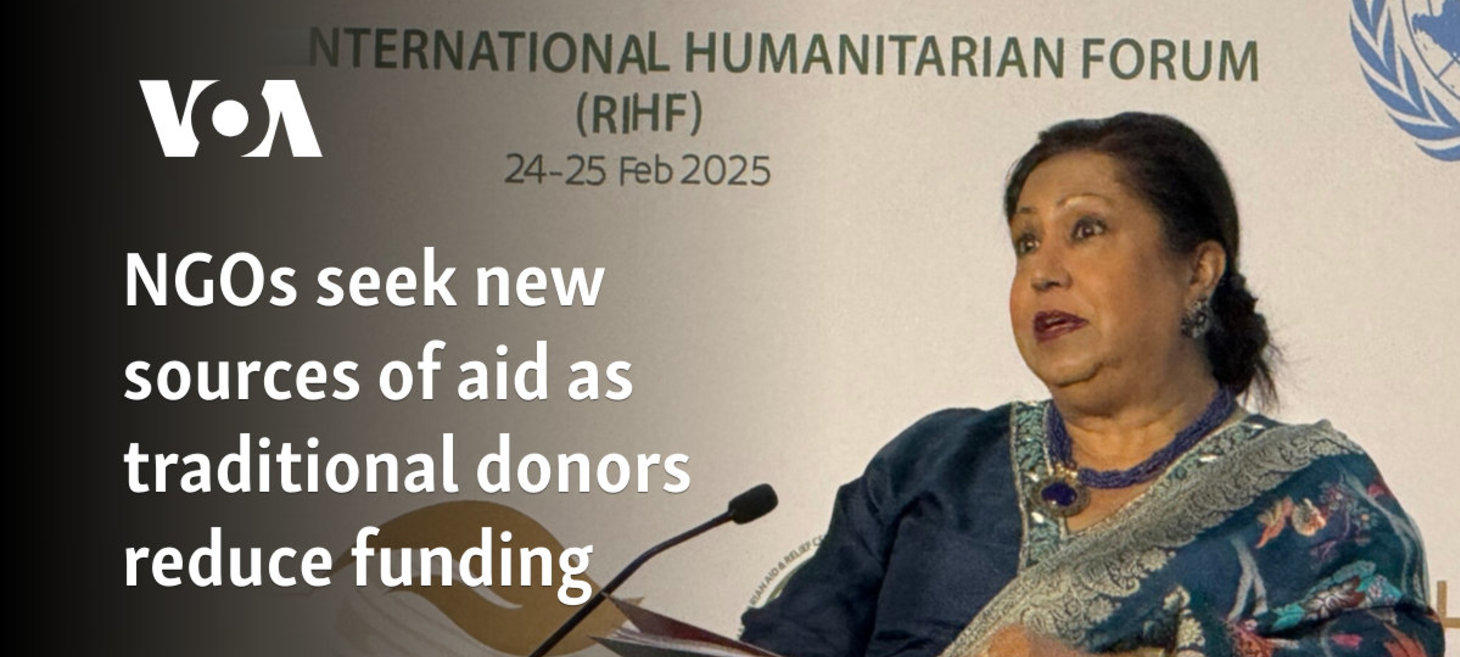
NGOs seek new sources of aid as traditional donors reduce funding
Due to reduced or halted funding from traditional Western donors, many humanitarian groups, including UNICEF and SOS Children's Villages International, are facing a significant challenge in meeting the increasing needs arising from conflicts, which disproportionately affect women and children, and climate change, particularly in regions like eastern and southern Africa. These organizations, speaking at forums like the U.N. and the Saudi-organized International Humanitarian Forum, where the theme was "Navigating the Future of Humanitarian Response," highlight the widening gap between available resources and the escalating demands for aid, including nutrition, water and sanitation, health, and protection against malnutrition. Consequently, some NGOs are actively seeking alternative funding from organizations such as the Saudi-based King Salman Humanitarian Aid and Relief Center (KSRelief), which is increasing its assistance to African countries. The U.N.'s special representative on sexual violence in conflict also emphasized the need to invest more in prevention by addressing the root causes of conflict, such as marginalization, poverty, and gender inequality.

Along Thai-Myanmar border, Trump’s decision to suspend foreign aid is deadly - The Guardian US
Following the suspension of US foreign aid by then-President Donald Trump, a 90-day USAID freeze, despite pledges of exemptions for life-saving assistance, had devastating consequences for Myanmar refugees along the Thai-Myanmar border. Countless charities and NGOs, including the International Rescue Committee (IRC), were forced to halt operations or reduce services, which included healthcare for approximately 90,000 refugees, mainly from the Karen ethnic minority, living in camps for decades or having fled the 2021 coup. This abrupt cessation of US funding, which amounted to $223.5m to Myanmar the previous year and constituted 31.6% of the country’s humanitarian response plan, led to the closure of health facilities and the inability to refer patients for treatment in Thai hospitals, impacting individuals like Wah K’Ler Paw and Pe Kha Lau who died after their care was disrupted. While the IRC reportedly received an exemption for some primary care services within the camps, crucial support for hospital referrals and mental health remained unavailable, leaving refugees without access to necessary medical treatment, a situation that Thai hospitals and other NGOs attempted to alleviate despite the significant challenges and financial burdens faced by the refugees.
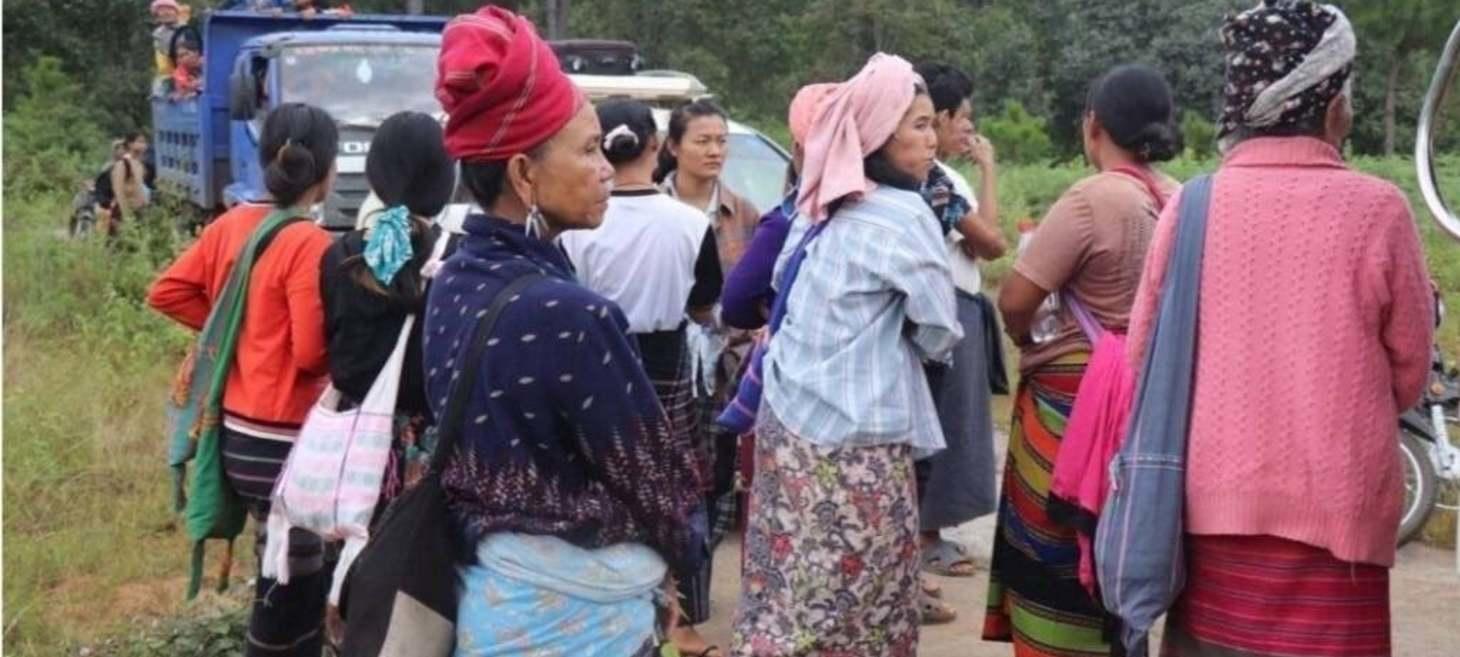
IDPs in Southern Shan State Face Dire Medicine Shortages Amid Humanitarian Crisis
Internally displaced persons (IDPs) in Southern Shan State are facing a dire humanitarian crisis characterized by critical shortages of essential medicines, including emergency contraceptives for women. This shortage is exacerbated by limited support organizations and affects camps in Hsihseng, the Inle Lake region, the Samka area, and along the Shan-Karenni border. Beyond medicine, displaced women and teenage girls lack access to vital sexual and reproductive health education due to the absence of rural health clinics. The crisis has deepened following the temporary suspension of USAID funding for refugee assistance, leading to a halt in essential health services and warnings of contraceptive supplies running out. The lack of clean water has also caused outbreaks of diarrhea and dysentery, particularly among children in areas like Samka. Furthermore, humanitarian aid efforts are being blocked by military forces and the Pa-O National Organization (PNO) militia, preventing much-needed supplies from reaching IDPs along the Shan-Karenni border. As a result, humanitarian groups are urgently calling for intervention to prevent further suffering and loss of life among the over 3,000 displaced individuals in peril.
Telecommunications
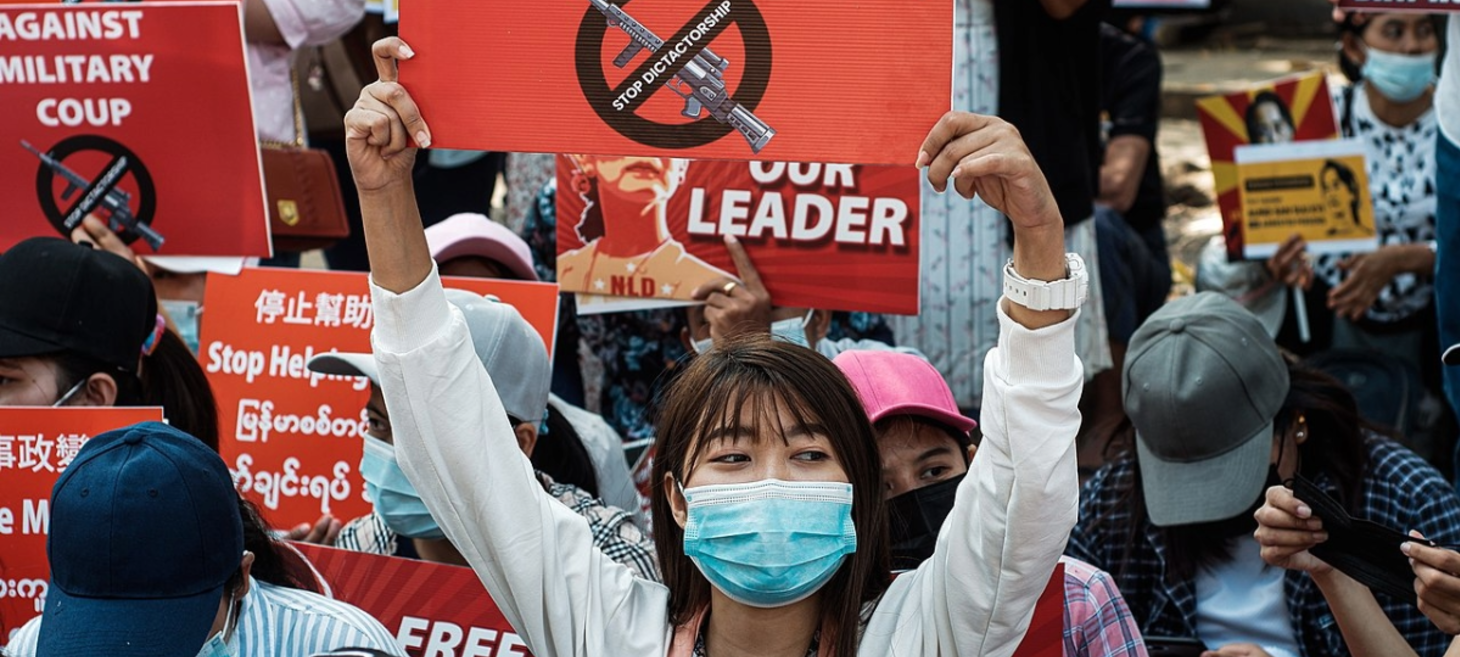
Fourth Year Under Myanmar Military’s Digital Iron Curtain: A Reflection on Digital Repression and the Path Forward - Tech Policy Press
Since the military coup in February 2021, Myanmar has experienced an escalating digital crackdown, with the junta tightening its control through internet shutdowns, advanced surveillance, and censorship, resulting in thousands of deaths and arrests, including many for online expression. The military enacted the Cybersecurity Law in early 2025 to further enhance its power over online activity, and in 2024, it intensified digital attacks with foreign-backed technology, deploying firewalls to block VPNs and encrypted messaging apps and advancing the e-ID project for enhanced citizen tracking. Support from countries like China, which provided firewall technology and census support, and India, which assisted with the e-ID system, has been crucial to these efforts. Despite resistance and efforts to find alternative communication methods, the junta continues to use internet shutdowns as a tool of oppression, often coinciding with military operations, leading to a severe connectivity crisis exacerbated by conflict and infrastructure issues, prompting calls for international action to cut off military-controlled telecom networks and halt technology transfers to support the people's fight against digital authoritarianism.
